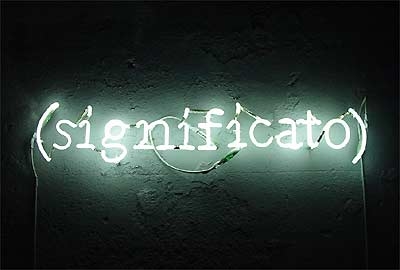Now, I happen to have just started studying at an art academy in Amsterdam, and I happen to have flunked the first assignment I did. According to my teacher, the work was too conceptual and rational. Unwilling to admit my absolute ignorance in art terminology, I listened around the C-word and somehow gave my teacher's critique form. However, the actual definition of conceptual, beyond adj. 1. Of or relating to concepts or mental conception: conceptual discussions that antedated development of the new product was now a new topic of curiosity.
Dictionary.com offers a second definition; 2. Of or relating to conceptualism. Now for conceptualism there is the following; 1. Philosophy. The doctrine, intermediate between nominalism and realism, that universals exist only within the mind and have no external or substantial reality. And more importantly for now; 2. A school of abstract art or an artistic doctrine that is concerned with the intellectual engagement of the viewer through conveyance of an idea and negation of the importance of the art object itself.
So Sol LeWitt, who gave birth to the term conceptual art, and who spent much of his time as a sculptor creating objects that had to have a certain ratio in supporting structure and occupied space, was simply trying to convey an idea of harmony between structure and space?
Thus I went to Premsela on the 6th of January to see what more tangible folks had to say about it. First of all, the moderator listed some reasons why conceptual has such a negative taste; apparently, it is dry, formless, emotionless, cold, verbal and lacks craftsmanship. A promising start, but once the floor is open to the debaters, suddenly the actual debate is about what the difference is between design and economy, and if contemporary designers are taking enough risks to hold value over mere production cows. Riveting as well, but not the main intention of my visit.
The only information on the definition of conceptual I get during the first debate is from a curator for Museum Boijmans van Beuningen. He said: There is not much in my museum. There is a lot to see, a lot of walls, a lot of wood, a lot of space. ... There are guides every hour that can take you through the museum, by the hand, and explain. So apparently, conceptual is about explaining the ideas of the artist, because apparently there is not only a negation of importance of the art object, but the art object simply isn't there.
Now the next set of debaters were architects. And one of the first things they said was; We architects do not like concept, or conceptual. Just as we dislike style. It smacks too much of something else, something bad. Not that we do things without thinking about them first, without ideas. As an architect, that is really impossible.
So here the true definition of conceptual to contemporaries peeks out. The negation of importance of the object is not seen as a consequence of the conveyance of the idea, but as an individual aspect that designers, artists and architects may abuse to adhere a constructed deeper meaning to a trivial object. Basing your design on a solid idea or concept does not necessarily bring it into the realm of what is now known as conceptual art, but indeed, a certain formlessness, a certain coldness and a dogmatic working method are really necessary to qualify. This turns conceptual into a deadline scapegoat, and an ease in creation, and even turns conceptual into an easy marketing term, which seems to be why the term is disliked, and even why there was a debate organized in its honor.
This assumption was confirmed during the last debate, in which a designer actually confessed to abusing the term conceptual to sell to Japanese clients. According to him, the Japanese like that kind of thing. So perhaps out there in Japan, conceptual does not yet have all these negative connotations, and out there they still think of conceptual as an object that took longer to develop than it took to make. I however, still do not know what to think.
